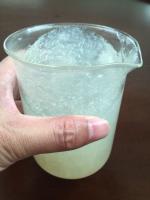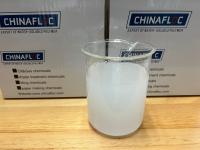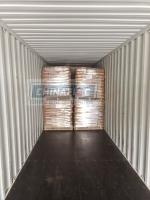SAP manufacturer|super absorbent polymer manufacturer in China
Superabsorbent polymers (SAPs) are a group of highly water-absorbent materials that can absorb and retain large amounts of liquid relative to their own weight. These polymers exhibit remarkable swelling properties when they come in contact with water or other aqueous solutions. As a result, SAPs are widely used in various industrial and consumer applications where high liquid retention is crucial. The main applications of SAPs span across numerous industries, with particular emphasis on hygiene products, agriculture, wastewater treatment, and industrial processes.
1. Hygiene Products
One of the most significant and well-known applications of SAPs is in the manufacturing of hygiene products such as baby diapers, adult incontinence products, sanitary napkins, and feminine hygiene products. In these applications, SAPs are primarily used to absorb and retain moisture, ensuring that the product remains dry and comfortable for the user.
-
Baby Diapers: SAPs are used in the absorbent core of baby diapers, where they play a crucial role in quickly absorbing urine and keeping it locked away, thereby preventing leakage. A typical diaper uses a combination of SAPs and fluff pulp to create a structure that efficiently holds liquids and minimizes moisture exposure to the baby’s skin.
-
Adult Incontinence Products: Similar to baby diapers, adult incontinence products such as adult briefs, pads, and pull-ups utilize SAPs to provide absorbency. Given that these products are designed for people with reduced bladder control, SAPs help to maintain dryness and prevent skin irritation or rashes.
-
Sanitary Napkins and Feminine Hygiene Products: SAPs are also used in sanitary napkins, tampons, and panty liners. They help absorb menstrual fluid and prevent leakage while ensuring the comfort and dryness of the wearer. These products rely heavily on the high absorbency and rapid fluid retention capabilities of SAPs.
2. Agriculture and Horticulture
SAPs are also employed in agriculture and horticulture for improving water retention in soil, reducing irrigation needs, and enhancing plant growth. These polymers are capable of absorbing large quantities of water, which can be slowly released back into the soil, ensuring that plants have consistent access to moisture over an extended period.
-
Soil Moisture Retention: In agricultural applications, SAPs are added to the soil to increase its water-holding capacity. This is particularly beneficial in arid or drought-prone areas where water scarcity is an issue. SAPs help reduce the frequency of irrigation while maintaining healthy plant growth. They also aid in preventing soil erosion by stabilizing the soil structure.
-
Hydroponics and Container Gardening: In hydroponics (soil-free farming) and container gardening, SAPs are mixed with growing media to improve water retention and nutrient availability. This is especially important in controlled environments where water evaporation rates are higher and maintaining consistent moisture levels is critical for plant health.
-
Mulching: SAPs are sometimes incorporated into mulch to help retain soil moisture and reduce the need for frequent watering. This helps conserve water and supports plant growth during dry spells or in regions where irrigation is limited.
3. Wastewater Treatment and Environmental Management
SAPs have found significant applications in environmental management, particularly in wastewater treatment and sludge dewatering. The ability of SAPs to absorb and retain water makes them useful in treating and managing waste products, particularly in industries that generate large amounts of liquid waste.
-
Sludge Dewatering: In municipal and industrial wastewater treatment plants, SAPs are used to dewater sludge. The polymers bind to water molecules in the sludge, making it easier to separate the water from the solid waste. This reduces the volume of sludge, making it more manageable and lowering disposal costs. Dewatered sludge can then be treated, reused, or disposed of more efficiently.
-
Oil and Gas Wastewater Treatment: In the oil and gas industry, wastewater treatment is a critical process. Drilling operations, for instance, generate large volumes of water contaminated with oils, chemicals, and other pollutants. SAPs can help to remove excess water from drilling fluids and wastewater, thereby improving the quality of the effluent and aiding in the recovery of valuable resources.
-
Oil Spill Cleanup: SAPs are also used in environmental cleanup efforts, such as the removal of oil spills. The high absorbency of SAPs allows them to soak up large amounts of oil, preventing it from spreading further and making cleanup efforts more effective.
4. Personal Care and Cosmetics
In addition to their use in hygiene products, SAPs are employed in a range of personal care and cosmetic applications. Their ability to absorb moisture makes them useful in products that require dry or water-retaining properties.
-
Face Masks and Sheets: SAPs are used in cosmetic face masks, including sheet masks, which are designed to hydrate the skin. The polymers help retain moisture and deliver a controlled amount of liquid to the skin, enhancing the effectiveness of the mask.
-
Deodorants and Antiperspirants: Some deodorant formulations contain SAPs to help absorb moisture from sweat and reduce the dampness of the underarms. This helps in controlling body odor and improving the overall comfort of the user.
-
Wound Care Products: SAPs are incorporated into wound dressings and bandages to absorb exudates from wounds. These products provide a sterile and absorbent environment that promotes healing and reduces the risk of infection by keeping the wound dry.
5. Food Packaging and Preservation
SAPs are also used in the food industry, primarily in food packaging and preservation. Their water-absorbent properties can help extend the shelf life of perishable products by reducing excess moisture.
-
Meat and Poultry Packaging: SAPs are used in packaging materials for meat and poultry to absorb excess liquid released from the product. This helps keep the product fresh for longer periods and prevents the growth of bacteria due to moisture accumulation.
-
Produce Packaging: Fresh fruits and vegetables often release moisture during transportation and storage. SAPs are incorporated into produce packaging to absorb this moisture, which helps maintain the quality and shelf life of the produce.
6. Construction and Civil Engineering
In construction, SAPs are used for various applications that require high moisture retention or water management. Their use in these industries can improve the performance of building materials and enhance the durability of construction projects.
-
Concrete and Cement: SAPs are incorporated into concrete and cement formulations to control the moisture content during the curing process. By absorbing excess water, SAPs can reduce cracking and enhance the overall strength and durability of the concrete.
-
Soil Stabilization: In civil engineering, SAPs are sometimes used to stabilize soil. The polymers can absorb and retain water, making the soil more resistant to erosion and improving its compaction, especially in areas prone to drought.
7. Oil, Gas, and Mining
SAPs are increasingly being used in oil, gas, and mining industries to manage waste, improve extraction processes, and enhance the recovery of valuable resources.
-
Drilling Fluid Management: In the oil and gas industry, SAPs are added to drilling fluids to improve their rheological properties. These polymers help control the viscosity of the fluid, ensuring that it remains effective in the extraction process.
-
Mining Applications: SAPs are used in the mining industry, particularly in the handling and disposal of mining waste. They are effective at binding to water in tailings and other waste products, reducing the volume of liquid waste and making it easier to manage.
8. Medical and Pharmaceutical Applications
SAPs have found medical applications where their water absorption properties can be harnessed to improve health and treatment outcomes.
-
Drug Delivery Systems: In pharmaceutical applications, SAPs are used as carriers for controlled drug delivery systems. The polymers absorb water in the body and slowly release the drug over time, improving the efficacy of the treatment and reducing side effects.
-
Hydrogels for Wound Healing: SAP-based hydrogels are used in wound care to maintain a moist healing environment. These hydrogels absorb exudates from wounds, promote faster healing, and reduce pain during the recovery process.
Conclusion
Superabsorbent polymers have a wide range of applications across various industries, demonstrating their versatility and utility. From hygiene products and agricultural applications to wastewater treatment and environmental management, SAPs play an essential role in addressing contemporary challenges related to water management, comfort, health, and resource conservation. As the demand for sustainable and efficient materials continues to grow, the importance of SAPs in both consumer and industrial sectors will likely continue to expand.






